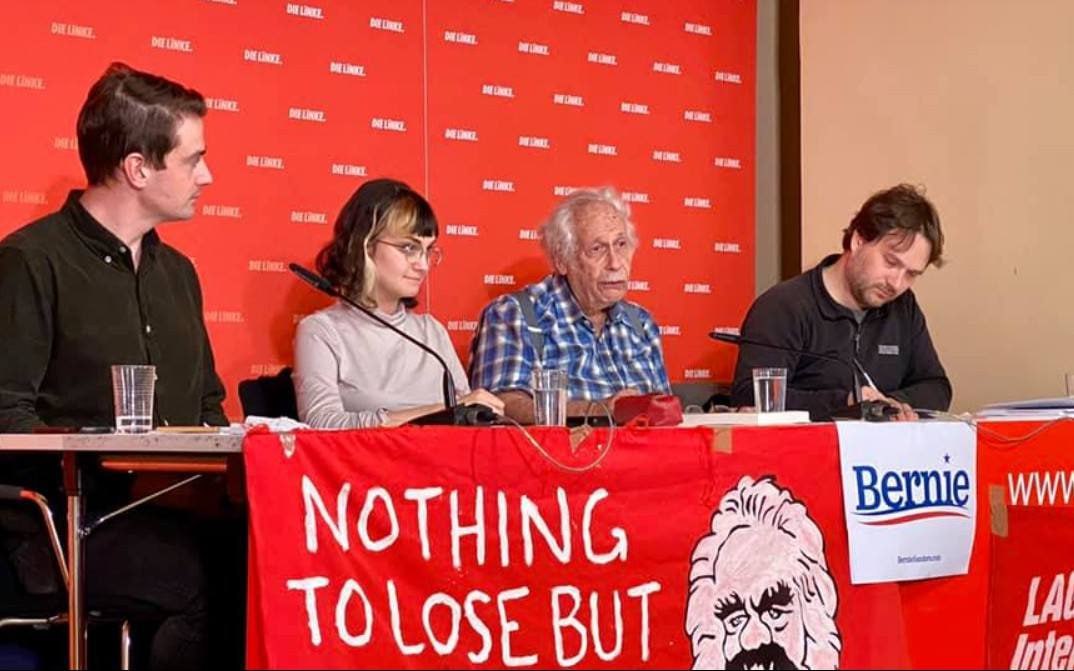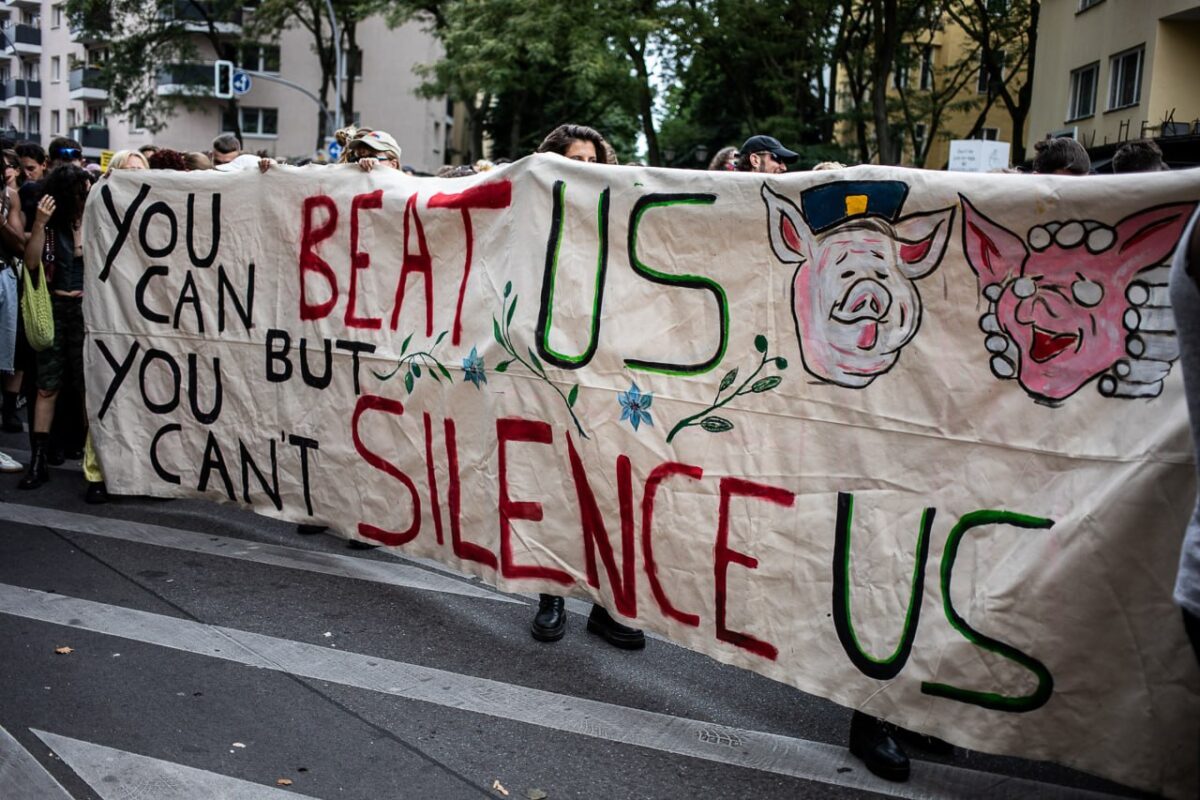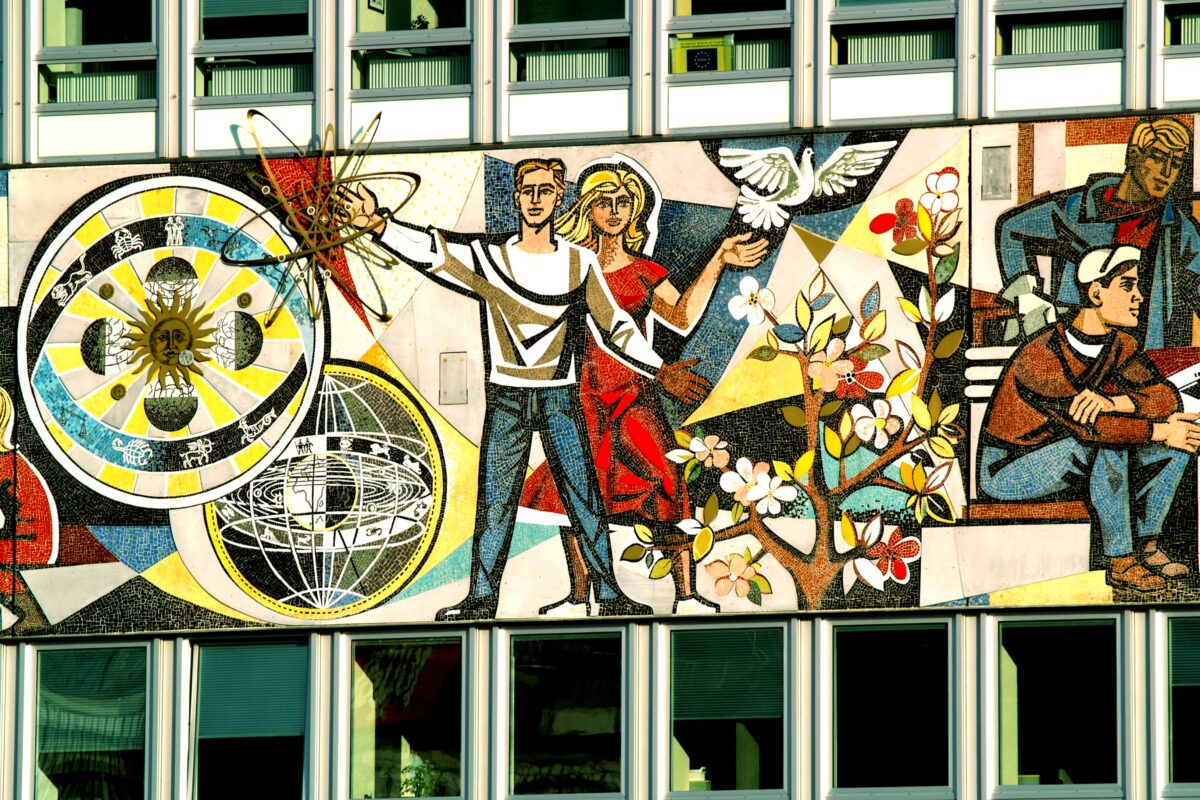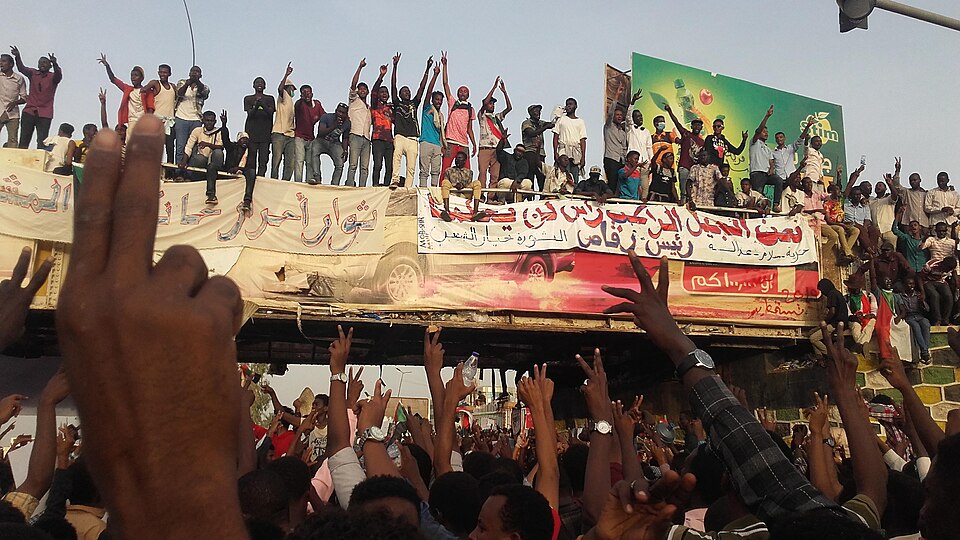Victor Grossman died on 17th December, 2025. He was 97, and for a long time it felt like he would go on for ever. Phil Butland remembers a comrade and friend.
I first met Victor in 2013, when we were setting up the Berlin Linke Internationals, the forerunner of The Left Berlin. Victor was excited by the idea of uniting International activists both inside and outside die Linke, and introducing German activists to people who had recently been involved in the Arab Spring, Occupy Wall Street, and the occupation of the squares in Spain.
He was particularly interested in developing new activists, attending every meeting which he could, and always being available to talk about his outstanding life, either as a public speaker in a large meeting, or in an informal chat. Well into his 90s, I would still see him at demos, where he would march as far as his ageing body would allow him. He was always keen to talk, and we would regularly march together until he felt unable to go any further and reluctantly went home.
One particular obsession of Victor’s was Sahra Wagenknecht. He adored her for fighting against the party bureaucrats who wanted to sacrifice the party’s opposition to NATO because they had eyes on a coalition government with the SPD or Greens. At the same time, he was deeply concerned about her racist populism. Many of the conversations we had on demos started with him asking me why I thought Sahra had made her latest “mistake.”
Between 2019 and 2023, theleftberlin.com published Victor’s Berlin bulletin—a weekly account to international friends about political developments in Germany. We stopped doing this after someone created a website for the Bulletin, as there was less need for us to provide what was available elsewhere. But there was also a feeling that Victor was losing his sharpness and starting to repeat himself. I still read the bulletin avidly, though, even after they became less regular.
Principled Opposition
I knew of Victor long before I met him. We were both members of die Linke in Berlin Mitte. We were in different branches, so our paths did not cross regularly, but he would occasionally pop up at a regional meeting making a pithy observation warning us not to trust the leadership. He remained particularly suspicious of a new layer of careerist party leaders, who he felt would just as easily have joined the SPD or the Greens.
At the same time, he was faithfully loyal to the party itself. This was, after all, the man who defected from the USA to the DDR at the height of the Cold War. Victor remained convinced that 1989 was a step backwards in German history. He could argue quite persuasively that following the Second World War, only one half of Germany denazified, as West Germany filled its government posts with former Nazis.
At the same time, he was never uncritical of the East German state or of the party leadership; he did believe that the uprisings in East Berlin in 1953 and Hungary in 1956 were organised by the CIA. By chance he was on a spa treatment in Czechoslovakia in 1968 when Russian tanks invaded to suppress Czech leader Alexander Dubček’s reform package called “socialism with a human face.”
In his autobiography, Victor wrote: “I was still torn. ‘Socialism with a human face’ was a great idea in itself; many of the improvements, especially regarding the humane climate, were desperately needed in East Germany. But behind this facade, I had seen how the country was noticeably sliding to the right, and how left-wing groups who dared to resist this trend were marginalized, even threatened.”
This was the dilemma which Victor continually faced. His belief in the Eastern Bloc was regularly contradicted by facts on the ground. Victor was honest enough to recognise this, but in the absence of any obvious alternative, he preferred the Eastern Bloc to rampant capitalism. Like his hero Berthold Brecht, he insisted that the DDR was the least bad option.
For this reason, Victor absolutely hated the film The Lives of Others, not because it criticised the Stasi but because, he maintained, the Stasi were a joke. Everyone knew who they were, and they didn’t disrupt ordinary life. You may disagree with his analysis, but it was understandable from a man who was threatened with one year in a US jail because he’d joined some anti-fascist organisations prematurely.
He retained this critical loyalty for the rest of his life. He joined the PDS, and then Die Linke, because where else could a socialist organise? You get the feeling that he felt the same about Die Linke as he did about Eastern Germany. He was fully aware of the Party’s shortcomings, but what was the alternative?.
One subject on which Victor remained particularly intransigent was on the issue of Palestine. As a Jewish socialist, Victor knew that his liberation was bound closely to that of the Palestinians. At a time when very few people on the German Left, and particularly die Linke, were prepared to stand up for Palestine, you could always bank on Victor to speak out, sign an appeal, or support a demo for Palestinian rights.
An extraordinary Life
Victor Grossman was born Stephen Wechsler in New York one year before the World Economic Crisis of 1929. He often humbly boasted that he was the only person ever to hold degrees from both Harvard and the Karl Marx University. As a teenager, he became very active in many Communist and Socialist organisations.
Then, in 1950, he was drafted for the Korean War and sent to train in West Germany. Before he was sent, he had to sign a statement that he was not a member of a list of named subversive organisations. Although he had indeed joined several of the groups on the list, Victor signed the statement anyway.
One day in 1952, he was called to appear before a military court in Nuremberg. Sensing it was to do with his false statement—which could lead to 1 year in prison—Victor decided to defect. He swam across the Danube and turned himself in to the bemused Soviet army which was occupying that part of Austria.
After 2 months detention, he moved to East Berlin where he started a new life, first as a factory and railway worker, later as a journalist and a loyal oppositionist. He befriended the actor Dean Reed—another defector from the US—who made a series of East German cowboy films told from the point of view of Native Americans.
Victor published his autobiography Crossing the River in 2014. Despite its English title, the book is in German, although in 2019 he did publish a shorter, English, version—A Socialist Defector: From Harvard to Karl-Marx-Allee.
Despite his many talents, Victor was a modest man. I will miss his perception, his energy, but above all his sense of humour. Victor was a witty man and a born raconteur. We did not agree on everything politically but he was a passionate internationalist who was prepared to argue his case and usually ended up on the right side.
Ingar Solty from the Rosa Luxemburg Stiftung adds
I am not the only person to miss Victor’s presence. I asked Ingar Solty from the Rosa Luxemburg Stiftung about his memories of Victor. Ingar sent the following text:
“During the late 1940s, early 1950s, with the victory of the Chinese Revolution and the beginning of the Cold War, the example of Victor Grossman shows that not only German socialist and communist survivors of fascism and world war could consider East Germany as the better German state insofar as all the demands of the social democrats and in fact the majority in the West were realized only here: de-nazification, land reform, and the socialization of industry.
This is why communist artists like Peter Hacks as well as Wolf Biermann moved from West to East. The example of Victor, however, shows that international communists could also be convinced that the GDR was a safe haven for them against the anti-communist witch-hunts of the early 1950s, stretching from the House of Un-American activities in the US to the Adenauer-Erlass in West Germany.
Victor Grossman then was a key actor with regards to the proletarian internationalism of real socialism. It was Grossman and the Canadian, Perry Friedman, who played a key role with regards to the interculturality connecting the American Folk Revival in the US with the Burg Waldeck festivals in West Germany and the Oktoberklub and hugely influential Singebewegung in the GDR.
Across the Cold War divide, at the height of bloc confrontation right after the Cuban Missile Crisis, there were socialists in East and West returning to the folk tradition in order to sing against the threat of nuclear warfare, for peace and social justice. Grossman’s radio program in the GDR brought Pete Seeger, Joan Baez, Peter Paul and Mary, and Phil Ochs to an East German audience and even to East Berlin itself. It also facilitated the particular internationalism which led to the massive show of solidarity coming from GDR civil society when Angela Davis was imprisoned.
In this regard, the other America always had a place in a country whose solidarity generally stood with the victims of US and Western imperialism who sought to liberate themselves from it, stretching from the revolutionaries in Cuba to the defenders of socialism in Chile and the ANC in South Africa.”
Salud Victor. The world will be a worse place without you.




